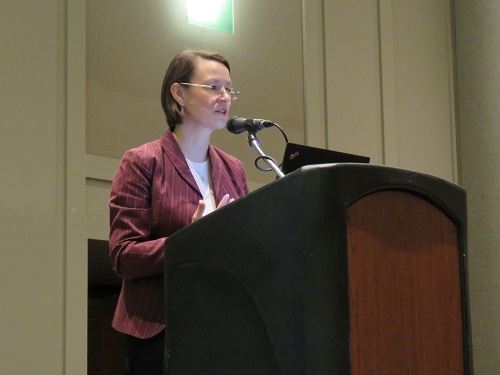Answers to Copyright Questions from an Expert
by Kathy Melago
As artists, the protection of the creator of artistic works should be important. I am grateful to attorney Catherine Parrish Lake from Stoel Rives LLP, who provided her services pro bono to the National Flute Association to share her expertise on copyright and guide us through understanding the basic aspects of copyright law most relevant to musicians.
In her session, Lake explained the laws, provided examples, and answered questions from the audience. Here I provide a brief overview of the basic topics that were covered, touching on highlights from my eight pages of notes.
Copyright protects tangible creations, not ideas or things that are not captured in some way, like by being recorded or written down.
Once an item is created, however, the owner of the copyright is the only person or entity that has actual rights to it. Any desire to use the item requires permission.
Lake guided the audience through how to determine what might be in the public domain, how infringements are handled, what financial penalties could happen for infringement, and how the Digital Millennium Copyright Act works in conjunction with online entities like YouTube. She covered uses of music by nonprofits and teachers in the classroom and explained what “fair use” actually is, reminding the audience that it is not a right or exemption but is, rather, a defense. Lake addressed performance, recordings, posting videos online, and how to find copyright owners.
This was an excellent and informative session. Lake was impeccably organized and knowledgeable. The questions from the audience showed that people are interested in ensuring that they understand the laws but that there still are many misunderstandings.
In my opinion, this should be an annual session at the National Flute Association convention to help us advocate for those who create the wonderful works and resources we have in our profession and to ensure that our members are informed of how to properly conduct themselves so as to avoid encountering huge fines.
This information does not comprise legal advice and is based on my understanding of what Lake covered. Anyone with questions should consult a copyright attorney for advice.

- Convention
- Scholarships & Competitions
- Resources & Publications
- Programs
-
Committees
- About Our Committees
-
Committee Webpages
- Career and Artistic Development Committee
- Flute Clubs Committee
- Global Flutes Committee
- Historical Flutes Committee
- Idea Committee
- Jazz Flute Committee
- Low Flutes Committee
- New Music Advisory Committee
- Pedagogy Committee
- Performance Health Care Committee
- Research Committee
- Special Publications Committee
- NFA Committees Blog
- Committee Web Presence Guidelines
- Giving
- About
- Community
- PayPal
- United States Armed Forces Ensemble